After having a baby, many women feel exhausted, overwhelmed, and emotionally drained. It’s normal. But what if your fatigue isn’t just from sleepless nights? What if you’re losing weight despite eating more, or gaining weight even though you’re not eating much? What if your heart races for no reason, or you’re freezing cold while everyone else is sweating? These aren’t just signs of being a new mom-they could be symptoms of postpartum thyroiditis, a hidden thyroid condition that affects 5 to 10% of women after childbirth.
What Exactly Is Postpartum Thyroiditis?
Postpartum thyroiditis is an autoimmune reaction that happens when your immune system, which was suppressed during pregnancy, suddenly wakes up after delivery and starts attacking your thyroid gland. It’s not caused by infection or poor diet. It’s your own body’s defense system going rogue. This attack causes inflammation, which leads to a two-phase thyroid dysfunction: first, too much thyroid hormone leaks out (hyperthyroidism), then your thyroid runs out of fuel and produces too little (hypothyroidism).
Unlike Graves’ disease-the most common cause of hyperthyroidism-postpartum thyroiditis doesn’t cause bulging eyes or a visibly swollen neck. There’s no goiter. The thyroid isn’t overactive because it’s being tricked into making more hormones. Instead, it’s damaged. The hormones are just leaking out from broken cells. That’s why radioactive iodine uptake tests show almost nothing-because the thyroid isn’t producing anything. It’s just leaking.
This condition usually shows up between 1 and 8 months after giving birth, with the hyperthyroid phase hitting first, often around 2 to 4 months. The hypothyroid phase follows, peaking at 6 months. About 70 to 80% of women will get back to normal thyroid function within a year. But 20 to 30% end up with permanent hypothyroidism and need lifelong thyroid hormone replacement.
The Two Phases: Hyperthyroidism Then Hypothyroidism
Most women don’t realize they’re going through two separate phases. They just feel like they’re falling apart.
The hyperthyroid phase (1-4 months postpartum):
- Heart rate over 100 beats per minute
- Feeling hot, even in a cool room
- Unexplained weight loss (4-7 pounds)
- Trembling hands or nervous energy
- Insomnia despite being exhausted
Many women think this is just anxiety or stress from being a new parent. Doctors often dismiss it as “normal postpartum adjustment.” But if you’re losing weight while eating normally, your heart is racing without exercise, and you can’t sleep even when the baby is sleeping-this isn’t just tiredness. It’s your thyroid flooding your body with excess hormones.
The hypothyroid phase (4-8 months postpartum):
- Extreme fatigue that doesn’t improve with sleep
- Feeling cold when others are warm
- Constipation, dry skin, brittle hair
- Weight gain (5-10 pounds) without change in diet
- Brain fog-trouble remembering names, focusing, making decisions
This phase is even more easily mistaken for postpartum depression. The emotional symptoms overlap: low mood, irritability, crying spells. But here’s the difference: with thyroid issues, your body feels broken. You’re not just sad-you’re physically drained. Your muscles ache. Your hair falls out in clumps. Your tongue feels swollen. Your voice gets hoarse. These aren’t just “baby blues.” These are signs your thyroid has run out of steam.
And here’s the catch: 10 to 25% of women skip the hyperthyroid phase entirely and go straight into hypothyroidism. They never feel the “too much” phase. They just feel worse and worse over time. That’s why skipping thyroid testing because you didn’t have a “hyper” phase is dangerous.
How Is It Diagnosed?
You can’t diagnose this with symptoms alone. Too many overlap with normal postpartum life. The only way to know for sure is blood tests.
Doctors check three things:
- TSH (thyroid-stimulating hormone): Low in hyperthyroid phase, high in hypothyroid phase.
- Free T4: High in hyperthyroid phase, low in hypothyroid phase.
- TPO antibodies: Present in 80-90% of cases. This confirms it’s autoimmune.
If you’re in the hyperthyroid phase, TSH will be below 0.4 mIU/L and free T4 above the normal range. In the hypothyroid phase, TSH climbs above 4.5 mIU/L and free T4 drops. TPO antibodies are the smoking gun-they show your immune system is targeting your thyroid.
Testing is simple. A single blood draw. But many doctors don’t order it unless you specifically ask. A 2022 study found that 65% of primary care doctors initially blame symptoms on “new mom stress.” Don’t wait for them to think of it. If you’re struggling beyond 6-8 weeks postpartum, ask for thyroid tests.
Who’s at Risk?
This isn’t random. Certain women are much more likely to develop it:
- Women with type 1 diabetes (25-30% risk)
- Those with a personal or family history of thyroid disease
- Women who had postpartum thyroiditis in a previous pregnancy (40% recurrence rate)
- Those with high TPO antibody levels before or during pregnancy
If you fall into any of these groups, you should be tested at 10-12 weeks postpartum-even if you feel fine. A 2021 JAMA Internal Medicine study showed that testing TPO antibodies at 10 weeks predicts 70% of future cases. Catching it early means you can manage symptoms before they spiral.
Even if you don’t have risk factors, don’t ignore persistent symptoms. One in ten women without any known risk factors still develops it. It doesn’t discriminate.

How Is It Treated?
There’s no cure-because it’s usually temporary. But there are ways to manage it.
During the hyperthyroid phase: Most women don’t need medication. The phase lasts only 1-3 months. If symptoms are mild (a slightly fast heartbeat, minor anxiety), doctors often recommend watchful waiting. If symptoms are severe-like a heart rate over 120, chest pain, or extreme anxiety-beta-blockers like propranolol can help slow the heart and reduce tremors. These aren’t thyroid meds. They just block the effects of excess hormones.
During the hypothyroid phase: If your TSH is above 10 mIU/L or you have symptoms, you’ll likely be started on levothyroxine, a synthetic thyroid hormone. This is safe during breastfeeding. Most women take it for 6-12 months. Then, doctors retest. If your thyroid function returns to normal, you can stop. If not, you’ll need to continue for life.
Here’s the key: don’t treat the hyperthyroid phase with antithyroid drugs like methimazole. Those are used for Graves’ disease, where the thyroid is overproducing. In postpartum thyroiditis, the thyroid isn’t making more-it’s leaking. Giving those drugs can make things worse.
Why It’s Often Missed-and Why That Matters
The average time to diagnosis? Over five months. That’s more than half a year of suffering, thinking you’re just “not coping.”
On Reddit’s thyroid community, 78% of women said they were first told they had postpartum depression. One woman spent six months on antidepressants before her TSH test came back abnormal. Another had to visit three different doctors before someone ordered a blood test.
Why does this matter? Because misdiagnosis leads to wrong treatment. Antidepressants won’t fix a thyroid that’s not working. And if you’re hypothyroid and don’t get treatment, your milk supply can drop, your energy stays crushed, and your risk of long-term hypothyroidism increases.
There’s also a financial cost. A 2023 UCLA study estimated that correctly diagnosing postpartum thyroiditis saves $2,300 per woman by avoiding unnecessary psychiatric care, repeated doctor visits, and prolonged disability.
Can You Breastfeed With It?
Yes. Levothyroxine is safe during breastfeeding. Only tiny amounts pass into breast milk, and they don’t affect the baby. Beta-blockers like propranolol are also considered low-risk. The real danger isn’t medication-it’s untreated hypothyroidism. Low thyroid levels can reduce milk production. If you’re struggling to breastfeed and feel exhausted, get tested.
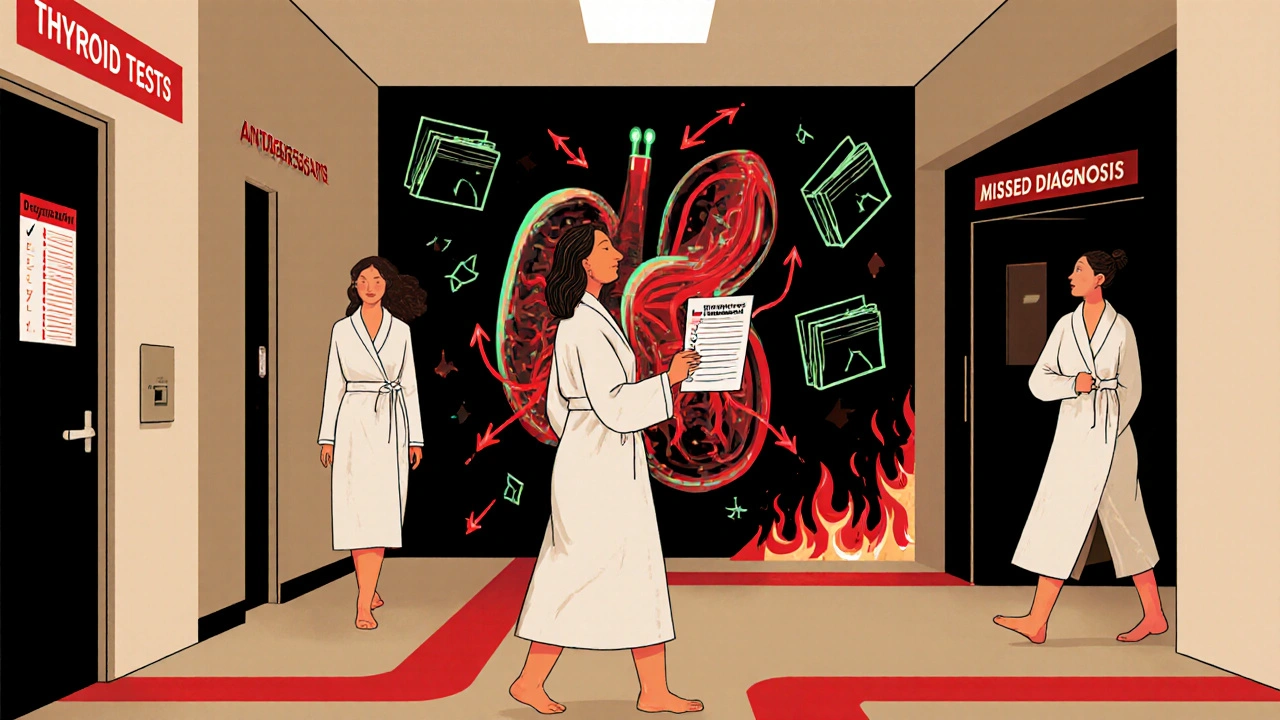
What Happens After?
Most women recover. But not all. About one in five ends up with permanent hypothyroidism. That means lifelong medication. But here’s the good news: once you’re on the right dose of levothyroxine, you’ll feel like yourself again. Your energy returns. Your hair stops falling out. Your brain clears up.
If you’ve had postpartum thyroiditis once, your risk of developing it again in future pregnancies is high-up to 70%. So if you plan to have another child, tell your OB-GYN. Get your TPO antibodies checked early in your next pregnancy. You can catch it before it hits.
What Should You Do Now?
If you’re a new mom and you’re not feeling like yourself after six weeks:
- Don’t assume it’s just exhaustion.
- Don’t wait for your six-week checkup if you’re struggling.
- Ask your doctor for TSH, free T4, and TPO antibody tests.
- Track your symptoms: weight changes, temperature sensitivity, heart rate, mood shifts.
- Bring this information to your appointment. Be specific.
If your doctor refuses, ask for a referral to an endocrinologist. This isn’t a rare condition. It’s underdiagnosed. You deserve to feel better.
Future of Screening
Right now, the American College of Obstetricians and Gynecologists doesn’t recommend routine thyroid screening for all postpartum women. But that’s changing. In Europe, 85% of countries already screen high-risk women. In the U.S., endocrinologists are pushing for universal testing at 6 and 12 weeks postpartum. A 2023 study in the Journal of Endocrine Society showed it’s cost-effective-and saves lives.
One hospital in Manchester started a postpartum thyroid clinic last year. They reduced diagnosis time from 5 months to under 2 months. They’re seeing better outcomes. More women are returning to work. More are breastfeeding successfully. More are feeling like themselves again.
You’re not alone. And you don’t have to suffer in silence. Thyroid dysfunction after pregnancy is real. It’s treatable. And it’s time more women knew about it.
Can postpartum thyroiditis cause long-term health problems?
Yes, in about 20-30% of cases, postpartum thyroiditis leads to permanent hypothyroidism, requiring lifelong levothyroxine treatment. Even if thyroid function returns to normal, women who’ve had it are at higher risk for developing Hashimoto’s thyroiditis later in life. Regular follow-up testing every 6-12 months is recommended.
Is postpartum thyroiditis the same as postpartum depression?
No. While both can cause fatigue, low mood, and brain fog, postpartum thyroiditis includes physical symptoms like rapid heartbeat, heat or cold intolerance, hair loss, and weight changes-symptoms not typically seen in depression alone. Many women are misdiagnosed with depression when their real issue is thyroid dysfunction. Blood tests are the only way to tell the difference.
Can I get tested for postpartum thyroiditis before giving birth?
Yes, if you have risk factors-like type 1 diabetes, a personal or family history of thyroid disease, or elevated TPO antibodies-you can and should be tested during pregnancy. Knowing your antibody levels helps your doctor monitor you closely after delivery and catch thyroiditis early.
Does breastfeeding affect postpartum thyroiditis?
Breastfeeding doesn’t cause it, but untreated hypothyroidism can reduce milk supply. Levothyroxine is safe during breastfeeding and often helps restore normal milk production. If you’re nursing and suddenly struggling with low supply, fatigue, or weight gain, get your thyroid checked.
How long does it take to feel better after starting treatment?
If you’re on levothyroxine for hypothyroidism, most women notice improved energy and mental clarity within 3-6 weeks. Full symptom relief can take 2-3 months as your body adjusts to the right dose. For hyperthyroid symptoms, beta-blockers can reduce heart rate and tremors within hours to days.
Should I get tested again if I plan to have another baby?
Absolutely. If you’ve had postpartum thyroiditis before, your risk of recurrence is 70% or higher in future pregnancies. Get your TPO antibodies checked early in your next pregnancy. Your doctor can monitor your thyroid function monthly after delivery to catch any changes before symptoms become severe.
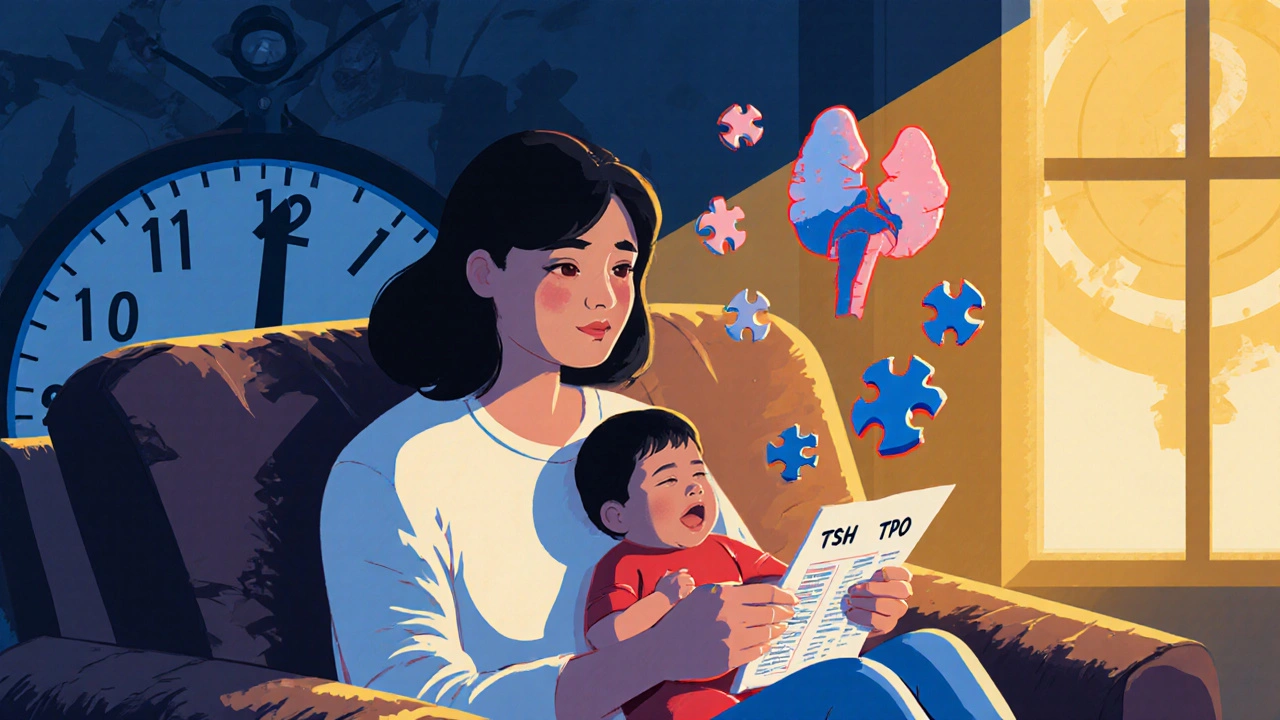
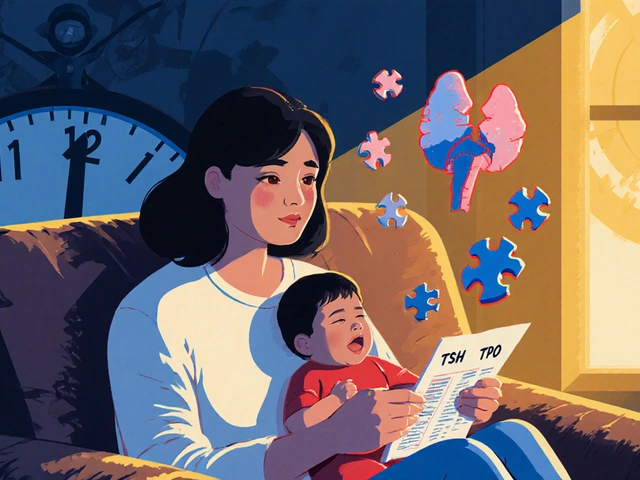


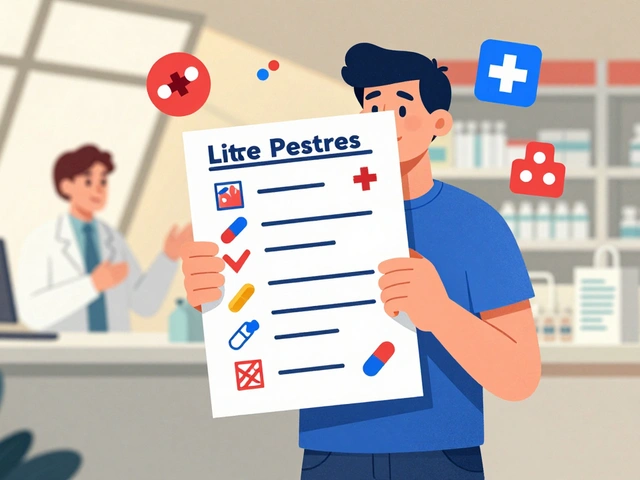

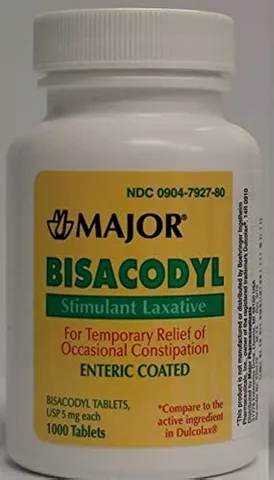

Sammy Williams November 21, 2025
bro this is so real. i thought i was just a bad mom until i got tested and my TSH was through the roof. levothyroxine changed my life.
Paula Jane Butterfield November 22, 2025
as a nurse who’s seen this a dozen times, i can’t stress enough: if you’re exhausted beyond sleep deprivation, get the full panel. TSH, free T4, TPO. Not just TSH. So many docs miss the antibody part and call it ‘stress.’ You’re not broken-you’re biochemically off. Ask for the test. Bring this post. They’ll listen.
jim cerqua November 23, 2025
THEY DIDN’T WANT TO TEST ME. SIX MONTHS. SIX MONTHS OF ANTIDEPRESSANTS WHILE MY HAIR FELL OUT IN THE SHOWER LIKE A WITCH’S CURSE. I CRIED IN THE WAITING ROOM BECAUSE THE NURSE SAID ‘YOU’RE JUST TIRED.’ I WASN’T TIRED. I WAS DYING INSIDE. AND THEN-BAM. TPO ANTIBODIES THROUGH THE ROOF. I WASN’T DEPRESSED. I WAS STARVING FOR HORMONES. THIS POST IS A LIFE RAFT.
Swati Jain November 24, 2025
yo this is the most accurate thing i’ve read since i got diagnosed. hyper phase felt like i was on Adderall on a rollercoaster. hypothyroid phase? felt like my body was running on dial-up. and yeah-no goiter, no bulging eyes, just pure invisible sabotage. TPO antibodies are the real MVP. if your doc doesn’t know what that is, fire them. or at least send them this link.
Donald Frantz November 25, 2025
Why isn’t this standard screening? It’s not rare. It’s not obscure. It’s predictable, measurable, and treatable. Yet we wait for women to collapse before we test them? This is systemic neglect disguised as medical inertia. If this were a male condition-say, post-prostate fatigue-we’d have a national task force. But because it’s tied to motherhood, it’s ‘normal.’ Bullshit.
Shawn Sakura November 27, 2025
i kno u guys r like ‘why is this so hard’ but trust me, if u get tested early, it’s a game changer. i had it after my first and didn’t know. second kid? got tested at 8 weeks. TSH was 12. started meds. felt human again by week 4. don’t wait. u got this.
Julia Strothers November 29, 2025
THIS IS A BIG PHARMA SCAM. Levothyroxine is patented. Beta-blockers? Made by Pfizer. They don’t want you to know thyroiditis resolves on its own. They want you hooked. The real cause? Vaccines. Or maybe glyphosate in the water. Or both. Ask your endocrinologist if they’ve ever read the WHO’s 2019 white paper on autoimmune triggers in postpartum women. No? Then they’re part of the cover-up.
Debanjan Banerjee November 29, 2025
Important clarification: while levothyroxine is safe in breastfeeding, the dosage must be carefully titrated. Many women overcorrect and end up with subclinical hyperthyroidism, which can affect infant heart rate. Always retest at 6-8 weeks post-initiation. And yes, TPO positivity pre-pregnancy is the strongest predictor-screen early, not after the crash.
Erika Sta. Maria November 30, 2025
But what if it’s not thyroiditis? What if it’s the patriarchy? The system doesn’t want mothers to feel powerful. So they pathologize exhaustion. They give you a pill instead of a nap. They call it ‘dysfunction’ when it’s just the body screaming for rest. You think a blood test fixes that? No. You need a village. You need policy change. You need maternity leave that isn’t a joke. This is capitalism treating biology like a glitch.
Elaina Cronin November 30, 2025
I am compelled to emphasize that the clinical evidence supporting universal screening is not yet conclusive. While anecdotal reports are compelling, the cost-benefit analysis remains contested by the American Thyroid Association. Until randomized controlled trials demonstrate improved long-term outcomes, routine screening cannot be ethically mandated. I urge caution against overmedicalization of normal postpartum adaptation.
Sandi Moon December 1, 2025
Of course, the American medical establishment is too lazy to implement screening. In the UK, we’ve had guidelines since 2017. But here? You’re expected to self-advocate while juggling a newborn, a job, and a broken healthcare system. Meanwhile, the pharmaceutical-industrial complex profits from the confusion. This isn’t medicine-it’s performance art for the uninsured.
Nikhil Purohit December 1, 2025
My wife had this after our daughter. She was diagnosed at 5 months. Started levothyroxine. Within 3 weeks, she was laughing again. Not just ‘less tired’-laughing. We cried. This isn’t just a thyroid issue. It’s a mental health lifeline. If you’re reading this and you’re struggling? Go get tested. Don’t wait. You’re not weak. Your body just needs a little help.